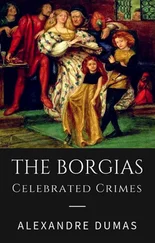The offer was accepted, just as the king had hoped. And so, on July 29, 1498, Alexander VI duly issued a papal brief listing eight reasons why the royal marriage was invalid and set up a commission of cardinals and prelates in France to examine Louis XII’s case for divorce. It was now time for Cesare to ‘put off the purple… with the least possible scandal… and with the most decorous pretext.’ Three weeks later, on August 17, as Burchard recorded:
There was a secret consistory in which Cardinal Cesare Borgia declared that from his early years he was always, with all his spirit, inclined to the secular condition; but that the Holy Father had wished absolutely that he should give himself to the ecclesiastical state, and he had not believed he should oppose his will. But since his mind and his desire and his inclination were still for the secular life, he besought His Holiness Our Lord, that he should condescend, with special clemency, to give him a dispensation, so that, having put off the robe and the ecclesiastical dignity, he might be permitted to return to the secular estate and contract matrimony; and that he now prayed the Most Reverend Lord cardinals to give their consent willingly to such a dispensation.
That same day, Louis de Villeneuve, Baron de Trans, arrived at the gates of Rome, bringing with him Louis XII’s letter appointing Cesare as Duke of Valence and an invitation for this new French aristocrat to visit his court. ‘He came in the name of the King of France,’ reported Burchard, ‘to escort the most reverend Cardinal of Valencia to that country.’ To the pedantic master of ceremonies, Cesare was still a cardinal, despite having announced his resignation, because his decision had not, that day, been ratified by the college.
Rather than agree to this most unusual arrangement, several cardinals had avoided voting by absenting themselves from the consistory on August 17, making the excuse that cases of plague in Rome rendered it prudent for them to leave the city for the healthier air of the countryside. But the pope called another consistory six days later, writing to all the cardinals who were in the neighbourhood, so the Venetian envoy reported, ‘telling them that they must come to Rome because matters concerning the welfare of the Church and Christianity were to be discussed. So the dissident cardinals yielded,’ clearly with some reluctance, ‘and Cesare Borgia could now take off his [cardinal’s] hat and make himself a soldier and get himself a wife.’ The twenty-three-year-old cardinal of Valencia had become the Duke of Valence, from which he derived his nickname, il Valentino. He was now free to marry and profess himself openly as a soldier.
Cesare’s behaviour had long been inappropriate for a prince of the church. He rarely wore his plain clerical garb, preferring instead the elaborate outfits of a courtier or even, on occasion, fancy dress. ‘Monsignor of Valencia exercises the practice of arms every day,’ wrote Cristoforo Poggio to Mantua on January 19, 1498, observing that he ‘seems resolved to be a gallant soldier.’ Nor were his religious observances such as those expected of a member of the sacred college: ‘Cardinal Valentino attended the solemn mass in the papal chapel,’ wrote Burchard on April 21, the Saturday after Easter, lamenting his conspicuous absence during the ceremonies held during Holy Week, ‘but he has not previously been seen there since Passion Sunday.’
Now that he was a duke rather than a cardinal, Cesare took pleasure in demonstrating his skills, martial and equestrian, before astonished spectators. The day after announcing his resignation from the sacred college, so the Mantuan ambassador Gian Lucido Cattaneo reported, he did so in Cardinal Ascanio’s hunting park before an audience that included Lucrezia and Sancia: ‘Armed as a janissary, with another fourteen men, he gave many proofs of strength in killing eight bulls,’ and, added Cattaneo, ‘in a few days I hope to see him fully armed on the piazza.’
Indeed, Cesare needed to hone his athletic skills to impress the French court, where he would soon be a guest, and spent much of his time practising ‘the exercise of arms, horses and leaping.’ He sometimes overreached himself; one day in the Belvedere, for instance, when practising leaps across the backs of horses and mules, he tried, in one bound, ‘to mount a mule rather taller than the rest,’ Cattaneo reported, ‘and when he was in the air the mule took fright and kicked him in the ribs and on the back of the head, and he lay unconscious for more than an hour.’
Cattaneo was, however, not so impressed with the new duke’s appearance. ‘He is well enough in countenance at present,’ he reported, somewhat grudgingly, ‘but his face is blotched beneath the skin as is usual with the great pox.’ These marks were the customary signs of secondary syphilis, and Cattaneo believed that Cesare was apprehensive about going to France to marry the Neapolitan princess Carlotta of Aragon, lest that scarred face of his, ‘spoiled by the French disease,’ would induce his intended bride to refuse him.
This was not Cesare’s only concern; there were reports that the king of Spain was ‘extremely displeased’ about the Borgia alliance with France. Cattaneo reported that the pope had assured one cardinal that Louis XII was most anxious to have Cesare in his service and the cardinal had replied that ‘it is true Valence is a dexterous man,’ but he warned the pope, ‘Beware, Holy Father, that you do not aim so high that if you or he fall, you will break too many bones.’ Many Italians also feared this alliance between the pope and a king who openly professed his claim to both Milan and Naples; it promised another invasion of the ruthlessmen of the north and, as Cattaneo dramatically put it, ‘the ruin of Italy.’
Such warnings did not deter Alexander VI, who was determined to do all that he could to further his son’s career. He raised 200,000 ducats to cover the expenses of Cesare’s trip to France to ensure that his appearance at the French court was as dramatically imposing as possible. This huge sum came partly, so it was believed, from impositions on the Jews in Rome and partly from the sale of goods confiscated by the pope from his Spanish majordomo, a converted Jew who had been appointed as bishop of Calahorra and had been charged by Alexander VI with heresy.
Cesare spent most of this money on ‘jewels, stuffs, cloth-of-gold and cloth-of-silver, silks and other luxurious goods, much of them imported at considerable expense from Venice.’ For his use on the journey to France, he commissioned a commode for his personal use, ‘covered with gold brocade outside and scarlet inside, with silver vessels within the silver urinals.’ It was said that even the shoes of Cesare’s horses were inlaid with silver and loosened so that they fell off to be picked up by the most nimble-footed among the cheering crowds.
So it was that, on October 1, 1498, Cesare left Rome for Civitavecchia, where two French galleys were waiting to take him to Marseilles. ‘We are sending you our heart,’ Alexander VI had written to Louis XII in a letter that Cesare was taking with him to France, ‘that is to say our beloved son.’ The pope watched the departure of his ‘beloved son,’ standing at the window of the Vatican until the cavalcade was out of sight.
Cesare was, as usual, gorgeously dressed, wearing a black velvet mantle over his shoulder, a white brocade tunic, a black velvet cap, sparkling with rubies, and boots sewn with gold chains and pearl droplets. Riding a bay horse caparisoned in red and gold, the French royal colours, he was accompanied by the French envoy Baron de Trans and by an ostentatiously large retinue: the members of his household, not forgetting his diligent physician, Gaspar Torella; a richly dressed crowd of young noblemen, Spanish and Roman; scores of pages, grooms, and guards; fifty mules and twelve carts piled high with baggage. Carefully secreted in his luggage was the cardinal’s hat for Georges d’Amboise, the archbishop of Rouen, and the dispensation, signed by the pope, that would allow Louis XII to remarry, providing, of course, the divorce commission pronounced in the king’s favour. The new duke was finally on his way to find his own bride.
Читать дальше











